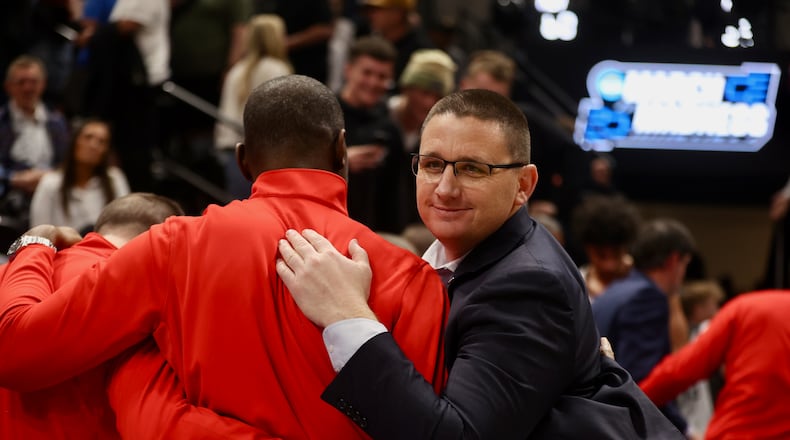“Each season takes a life of its own as you see with the roster, but there’s no doubt that our focus is relentless consistency and sustainable success,” Sullivan said Monday. “We’re not trying to be in and out and up and down. I feel we’re maniacal about our process and our discipline and our approach, and it was good to see that the results came this year.
“I’ve said before, ‘We’re in a results-based business.’ We’ve got to have the results. We did. I also felt like we’ve been right there, absent a few injuries these last couple of years. We were able to stay just healthy enough this year. Some teams are in different places. Some programs are reloading, rebuilding, whatever. Everything that we do is built on just being a jackhammer that never stops. We do have to continue to capture that. It was a great home season this year, a great arena atmosphere. Our fans were elite, as they always are. We plan to carry the momentum as best we can. As coach Grant often talks about, each game is its own independent challenge and each season is that, but there is no doubt that consistency is the priority.”
Dayton has been a consistent winner in Grant’s tenure with no losing seasons since his first season in 2017-18. It has been a consistent contender in the Atlantic 10 Conference with five top-four finishes in seven seasons.
What Dayton has not done consistently is achieve the big goals. It has twice built a NCAA tournament at-large resume (2020 and 2024); It has one won A-10 regular-season championship (2020). It has not won the A-10 tournament, though only one coach in UD history (Oliver Purnell in 2003) has done that.
Finding consistency is harder than ever with the changes that have come to the NCAA. Players can now transfer as many times as they want without sitting out a season. They can profit off the use of their name, image and likeness and negotiate contracts with NIL collectives before signing with programs.
Sullivan called it the “most challenging period in college sports history.” He has kept Dayton fans up to date on the rule changes with periodic emails.
In his latest email to season-ticket holders on April 3, Sullivan informed them there would not be an increase in per-seat donations for the 2024-25 season. The original plan when the UD Arena renovation project was announced in 2017 called for no price increases for a five-year period from the 2019-20 season through the 2023-24 season.
Sullivan explained why UD delayed the price increase in the email.
“Given the uncertain legal and regulatory matters around student athlete compensation and benefits, I have decided to delay the increase in the Arena Seating Program until the path of litigation and government inquiries (National Labor Relations Board, Congress, etc.) into college sports is more settled,” he said. “Serious questions of labor law and numerous antitrust lawsuits could fundamentally alter the relationship between institutions and student-athletes in the near future. One possible outcome is institutions compensating students directly for their athletic services and for use of their name, image and likeness, as opposed to only third parties. If that occurs, we will have to navigate the market conditions together.”
Universities paying athletes directly could be right around the corner. For now, Dayton 6th, the NIL collective that represents UD athletes, is the middle man, so to speak. Matt Farrell, who runs Dayton 6th, plays a key role by meeting with potential recruits, as he did with Ohio State transfer Zed Key earlier this month.
“I’ve been at Dayton since 2006,” Sullivan said. “Throughout that time, we’ve made dramatic investments in recruiting AND retention, as well as coaching and fan experience at the arena. Those probably total well over $100 million in my time. While they all matter, I’d say never before has anything shaped our ability to retain and recruit players more than NIL, and there’s not a close second. Never before have we had to rely exclusively on third parties outside the university to do that. Dayton 6th has been as important as anything that we’ve done in my time, and I’m thankful that they share our values as a community and as a program. I’m not very good at negotiating trust, and I don’t do that and I trust Matt and his team. We would not have had this past season and we wouldn’t be in a position going forward without them. I can’t make it any more clear than that.”
Credit: David Jablonski
Credit: David Jablonski
Sullivan spoke to a group last week and told people if they were on the fence about making contributions to Dayton 6th, now is the time to get off it. Dayton has three open scholarships and could have another one if DaRon Holmes II enters the professional ranks. Finding more talent in the transfer portal as UD coaches did last spring when they added Nate Santos, Javon Bennett, Enoch Cheeks and Isaac Jack will be key to the program staying consistent.
Sullivan also understands why fans would be hesitant to invest. It’s rare these days to watch a player develop at a school for four years. Brea did that but had an extra year and will now finish his college career elsewhere. Sullivan echoes the sentiments of those fans.’
At the same time, Sullivan said, “We have to confront reality. We have to confront where we are. The reality is that through a number of different factors — the courts being probably the biggest one right now — the Ohio Attorney General, along with West Virginia, brought suit against the NCAA and said there should be essentially unlimited transfers and unlimited free agency and a judge agreed. I think that our job is to adapt to the environment that we’re given but also stick to our values as a community and as an institution and what we stand for.
“We have no plans on that changing, but the reality is that rosters likely could turn over up to 50% each year. That doesn’t mean that our culture and the premium that we place on people and relationships have to change. I recognize the challenge. I understand that as we’ve had to adapt as a program and as a school that fans and supporters have to make their own personal adaptations if they choose to do so. Some may choose not to. Based on the feedback I get, we may not like some of these changes, but we dislike and hate losing more.”
Sullivan said Dayton is in a good spot when it comes to competing with other programs in the NIL arena. That didn’t stop Brea, the nation’s leading 3-point shooter last season, from entering the transfer portal, however. Brea told a group of national recruiting writers Monday he will choose from a list of five national powerhouses: Kansas; Duke; North Carolina; Connecticut; and Kentucky. He put himself on the market, as so many players from across the country have done this spring.
“I do my best to refrain from commenting about individual players,” Sullivan said. “I try to let coach Grant and the players speak for themselves. I will say that the transfer portal is kind of a two-way street. The portal has been good to Dayton, and for the first time, recently, the portal and the environment hit Dayton. Nobody is immune to it. It’s gone from a two-way street, essentially, to a multi-dimensional street with no direction, no speed limits, no traffic lanes. I’m not going to speak for others’ motivations, but I am confident in what Dayton has to offer — and that includes NIL. I believe we have the best holistic basketball experience in the country. That includes NIL. I’m confident in our ability to compete. If a player chooses otherwise, they’ll have to speak for that for themselves. But I’m confident that we’re prepared to field a competitive team.”
While UD is well positioned with Dayton 6th, Sullivan also knows they have to continue to “push the envelope” because “what got us here won’t get us there.”
Sullivan said recruiting is a daily conversation and an all-consuming endeavor for Dayton coaches right now.
“They’re competitors,” he said. “Coach Grant is a very stoic, stable leader who is very consistent. We try not to let the white noise distract from the mission. Our mission has not changed. It is to win conference championships, play in the NCAA tournament and advance. Over time, if you go back over history, the things that you need to do have changed. You can change with it and adapt to it, or you can lose. We choose to adapt and change and play the game as the rules are set. Our coaching staff understands that. It doesn’t mean we like everything about it. I don’t think there are too many people right now across the country who think this is a great system and that if we had to draw it up again like this we would, but at the end of the day, this is where we are. There’s universal consensus that the business is in a little bit of crisis mode, but there’s very little consensus on the solution. We try to focus on solutions and not spend time complaining about it. Times like this require bold leadership and decisive action, and that’s what we have to have.”
About the Author



